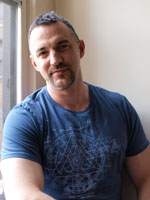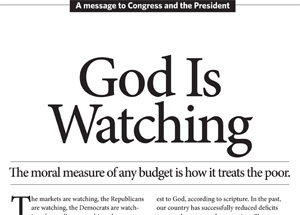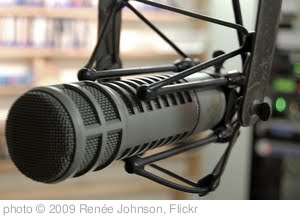Poverty
[Editors' note: This post is part of a series over the last few weeks on youth homelessness. In the September/October issue of Sojourners magazine, the Ali Forney Center and the Gay and Lesbian Alliance Against Defamation (GLAAD) ran an ad to raise awareness of the serious problem of LGBT youth homelessness.]
homelessness.]
Fact 1) About 40 percent of the homeless youth in the United States identify as lesbian, gay, bisexual, or transgender.
Fact 2) One in four teens rejected by their families becomes homeless.
Fact 3) Parents who identify as strongly religious are three times more likely to reject their children.
Yet for Carl Siciliano, founder and president of the Ali Forney Center, these aren't just facts -- they are his daily life.
Did anyone else get the feeling, as we watched weather reporters wave their arms frantically in swirling motions across oversized maps of the eastern seaboard -- with their eyes bulging as they pushed out whole paragraphs without a single breath for a period -- that this was all hype?
Last weekend, as Irene passed over town after town in the mid-Atlantic, memories of Katrina did not materialize. By the time Irene huffed over New York City on Sunday morning, and the flood of the century was actually just a really big puddle in Battery Park and a floating lifeguard stand in Long Beach, my fear had transformed into complacency. From there I became cynical. By Sunday afternoon I found myself watching the weatherman's bulging eyes as he repeated the mantra of the day: "It's not as bad as we thought it would be, but it's not over." And I thought: "Boy, they'll do anything for ratings."
But it wasn't all hype.
My daughter attended her first day of kindergarten today. A poignant milestone dressed up in an exceptionally cute plaid jumper.
My wife and I thought we were pretty cool with it. Our daughter had attended preschool, after all, so this wasn't a major logistical change. She was excited as we dropped her off, said goodbye with a smile over her shoulder, then back to drawing in her new notebook.
We still thought we were cool with it after we signed up for PTA at the courtyard table. We ran into the local rabbi. My wife is pastor at a Lutheran church in town and they cross paths regularly. The rabbi's third child was starting kindergarten. He's an old hand at this.
The forthcoming dedication of the national memorial monument honoring Rev. Dr. Martin Luther King, Jr., affords an opening for considering the complexity and meaning of his leadership. He was not the tamed and desiccated civil hero as often portrayed in the United States around the time of his birthday, celebrated as a national holiday. He was until the moment of his death raising issues that challenged the conventional wisdom on poverty and racism, but also concerning war and peace.
King was in St. Joseph's Infirmary, Atlanta, for exhaustion and a viral infection when it was reported that he would receive the 1964 Nobel Peace Prize. As Gary M. Pomerantz writes in Where Peachtree Meets Sweet Auburn, this was the apparent cost exacted by intelligence surveillance efforts and the pressures of learning that Attorney General Robert F. Kennedy had formally approved wiretaps by the Federal Bureau of Investigation. His evolving strength as a leader is revealed in his remarks in Norway that December, which linked the nonviolent struggle of the U.S. civil rights movement to the entire planet's need for disarmament.
More than 140 prominent Protestant leaders from 12 Latin American countries have signed an "open letter to the Christian churches of the United States," asking American Christians to stand with "the most vulnerable members of US society" who would be affected by proposed budget cuts to the social safety net.
Citing the Circle of Protection as a positive Christian witness, the signers also expressed their dismay. "We view with deep concern recent decisions in the United States that will add to the suffering of the most vulnerable members of US society," the letter read. It was signed by a broad array of Latin American religious communities, including leaders of the Latin American Council of Churches, the United Bible Society of Latin America, evangelical councils and alliances in Peru, Ecuador, Honduras, Argentina, Brazil, Bolivia, and Uruguay, the Fellowship of Evangelical Churches (CONELA), the Association of Reformed and Presbyterian Churches of Latin America (AIPRAL), Micah Network, Indigenous Association of Peruvian Amazonia, and the Latin American Biblical University in Costa Rica.
[Editors' note: Below is a hymn written by Carolyn Winfrey Gillette to inspire churches to further support and pray for famine relief in Somalia.]
O God, You Love the Needy
7.6.7.6 D LLANGLOFFAN ("Rejoice, Rejoice, Believers")O God, you love the needy and care for all the poor!
Today our hearts are heavy with news of drought and war.
When plantings yield no harvest, when hungry people die,
When families flee, defenseless -- Lord, hear your people's cry!
About two years ago, Minhee and I made one of the hardest decisions we've made thus far in our marriage and in our calling as parents.
In our hope to honor a conviction of the Holy Spirit to give up a year's salary, we had begun the two-year process of saving, selling, and simplifying in 2007. Our goal was to come up with our then year's wages of $68,000 -- in order to launch One Day's Wages. With only a few months left to come up with the total sum, we were a bit short and decided to sublet our home for couple months and asked some friends if we could stay with them on their couches or their guest room.
Needless to say, it was a very humbling time.
Our instruction for ourselves and our children were very simple: Each person gets one carry-on bag for their belongings.
When it comes to homeless youth the facts are simple, services in the City of Chicago are falling far behind the need. A survey of Chicago public school students from 2009/10 revealed 3,682 children who identified as being homeless and in need of shelter. In contrast there are approximately 189 beds for homeless youth (ages 18-25) funded by the City of Chicago. In 2010, 4,775 homeless youth were turned away from youth shelters for lack of room. To be clear, that was 4,775 instances where homeless youth sought shelter and were unable to find it. To date there are only 10 percent of the beds needed to provide safe shelter and supportive programs for the estimated number of Chicago's homeless youth.
Broadcaster Tavis Smiley and Princeton professor Cornel West just wrapped up their 18-city "Poverty Tour." The aim of their trip, which traversed through Wisconsin, Detroit, Washington, D.C., and the Deep South was to "highlight the plight of the poor people of all races, colors, and creeds so they will not be forgotten, ignored, or rendered invisible." Although the trip has been met with a fair amount of criticism, the issue of poverty's invisibility in American media and politics is unmistakable. The community organizations working tirelessly to help America's poor deserve a great deal more attention than what is being given.
The main attack against the "Poverty Tour" is Smiley and West's criticism of Obama's weak efforts to tackle poverty. For me though, what I would have liked to see more is the collection of stories and experiences from the people West and Smiley met along their trip. The act of collective storytelling in and of itself can be an act of resistance.
Picture this: Hundreds of thousands of women, men, and children plod across barren cracked earth. Dead cows and human corpses litter the roads, revealing to us evidence of two things: 1) the hottest summer on record in Somalia, which caused the worst drought and famine in 60 years; and 2) twenty years of a truly failed Somali government swallowed up in cycles of violence.
Picture this: Posturing politicians claim to stand up for the rights of Americans, even as they hijack the proverbial steering wheel of America. They hold a proverbial gun to the heads of every American, and say outright that they'd have no problem driving us all off a proverbial cliff if millionaires and billionaires don't remain protected from raised taxes, and if we don't cut more programs that protect working and poor people.
The first few nights weren't so bad. It was on the fourth night, the night it rained, that it got to me. I had just spent the past week sleeping on the sidewalk in front of the Illinois state Capitol building in Springfield. Throughout the week, young people of faith, college students, as well as homeless and formerly homeless youth traveled from Chicago to Springfield. Some slept on the sidewalks at night, and others came solely to lobby their legislators. We were all there for the same reason -- because each year nearly 25,000 youth experience homelessness in the state of Illinois. Not only were there not the resources to help these youth, but most legislators and most of the general public didn't even realize the problem existed.
In the past few weeks, I've written about a lot of full-page ads. This full-page ad is different. Too often, homeless youth have been invisible. The Ali Forney Center, a service provider for LGBT homeless youth, has a full-page ad in this month's issue of Sojourners magazine. GLAAD, the Gay and Lesbian Association Against Defamation, connected the Ali Forney Center to Sojourners, as a part of an advertising campaign the Ali Forney Center is running. The ad highlights that up to 40 percent of homeless youth identify as lesbian, gay, bisexual, or transgender. I have talked with many teens who became homeless because they were kicked out of their homes or ran away from abuse by their parents because of their sexual identity. After their homes became dangerous, they went to the streets, where many were attacked and some were trafficked or forced into prostitution.
Do yourself a favor and watch this. It's 7:15 minutes long but well worth your time.
Such a substantive leadership lesson in itself by Bill Hybels as he explains why Howard Schultz withdrew his commitment as a speaker at the Willow Creek Leadership Summit (held on August 11-12). And furthermore, how he and Willow Creek are responding
When I first visited Ethiopia at the height of the 1984 famine, I watched as twenty-four people died of starvation in less than fifteen minutes, right in front of my eyes. Barely five years into my career as a Congressman, nothing my staff told me beforehand could have prepared me for what I saw on that trip.
Gasping at awful photographs of unspeakable human suffering is one thing; bearing firsthand witness to human suffering is another thing entirely. Glancing at a picture of a starving child in the newspaper, you can always turn away, but when you're staring into the eyes of a mother who has just lost that child, it's a completely different story. There's no looking the other way.
That's why I often describe those first Ethiopia experiences as my "converting ground" on issues of global hunger. What happened in Ethiopia changed me, and changed how an entire generation looks at hunger.
It's also why I'm currently back on the Horn of Africa, reporting on the ground from the Dadaab refugee camp in eastern Kenya, less than fifty miles from the Somali border. And I am appealing to my affluent brothers and sisters in the United Stated and around the world not to look away. We need your help.
Some sources have stated that more than 12 million people are being impacted by the worst drought and famine in the region of the Horn of Africa in 60 years.
12 million people.
How do you wrap your head around such a number?
12,000,000
You begin with one.
The World Food Programme, for example, has shared that they can provide a nutritious meal for one person for .17
The other day the mail brought an advertisement for something I desperately need (or so the ad suggested). If I ordered it right now, the ad said, I would save a hefty percentage off the usual price. In vain I searched the flyer for the price. None was listed -- not the total, not my monthly payment. I was apparently supposed to place my faith in the kindly marketers and order it anyway.
I guess I should be used to this sort of marketing. After all, that's how our federal government does business. Shall we a. fight a war in Iraq? b. add a war in Afghanistan? c. subsidize medical care for seniors and the poor? d. rescue failed financial institutions? e. subsidize growers of corn and soybeans? or f. fund interstate highways?
John Stott died this Wednesday. He was 90 years old. What many people don't understand is that he was the most influential 20th-century evangelical leader in the world, with the exception of Billy Graham. Stott became the Anglican rector of All Souls Church in downtown London at the age of 29 in 1950, and he stayed there for his entire ministry. But from his parish at Langham Place in the city's West End, and right across from BBC headquarters, John Stott spoke to the world with 50 books that sold 8 million copies. He also traveled the globe , speaking, teaching, convening, mentoring, and bird watching -- a personal passion.
Perhaps the most telling thing about this man is all the personal stories about "Uncle John" that the world is now hearing, from many Christian leaders around the world who were profoundly influenced, encouraged, and supported by John Stott. And secondly, how such a giant in the Christian world remained so humble, as testified to by those who knew him who say how "Christ-like" he was.
 The markets are watching, the Republicans are watching, the Democrats are watching, the media are watching, the pollsters and pundits are watching. The public is watching and is disgusted with Washington, D.C.
The markets are watching, the Republicans are watching, the Democrats are watching, the media are watching, the pollsters and pundits are watching. The public is watching and is disgusted with Washington, D.C.
When it comes to the bitter and ultra-partisan battles over the budget, the deficit, and the fast-approaching deadline for America defaulting on its financial commitments, the whole nation and even the world is watching.
But God is watching too.
"God is Watching," reads the headline for a full page ad Sojourners ran in this morning's Politico. It is the latest in a series of radio, print, and online ads we have put out on the budget debate and default crisis. On Tuesday, we launched radio ads in Kentucky, Nevada, and Ohio that were recorded by local pastors who lifted up the moral issues at stake in the debate.
Furthermore, our work in the past few weeks and the Circle of Protection meeting with the president has been covered by the Washington Post (and here), CNN (and here), MSNBC, Politico, Roll Call, and many local outlets from across the country. Behind all the ads and the press is the muscle -- and that muscle is you.
Where has all the sanity gone?
I, for one, never expected in my wildest dreams to pine for the days of Ronald Reagan. But I'm there.
And for everyone who is blaming "everyone" on this debt ceiling debacle, you're just dead wrong. The Democratically controlled House and Senate in the 80s did not hold President Reagan hostage when he had to raise the debt ceiling. And that is exactly what is happening. And the problem is that this is a train wreck that has been months in the coming. The only thing that we don't know is how bad the carnage will be.
 If you live in Kentucky, Nevada, or Ohio and listen to Christian or country radio, you'll be hearing some of Sojourners' new radio ads calling for legislators to remember the least of these during this default crisis. For those of you who haven't completed your migration over to Google+, you might also start to see some ads popping up on your Facebook page in the next few days asking you to speak out on behalf of those in need. The reason we are running these ads is simple: The rich have lobbyists while those in need don't, and that's why Christians need to speak out and form a "Circle of Protection." If you don't live in one of these areas (or aren't listening to Christian or country radio) you can listen to the ads here.
If you live in Kentucky, Nevada, or Ohio and listen to Christian or country radio, you'll be hearing some of Sojourners' new radio ads calling for legislators to remember the least of these during this default crisis. For those of you who haven't completed your migration over to Google+, you might also start to see some ads popping up on your Facebook page in the next few days asking you to speak out on behalf of those in need. The reason we are running these ads is simple: The rich have lobbyists while those in need don't, and that's why Christians need to speak out and form a "Circle of Protection." If you don't live in one of these areas (or aren't listening to Christian or country radio) you can listen to the ads here.